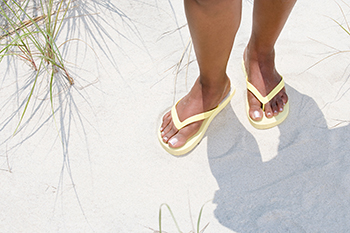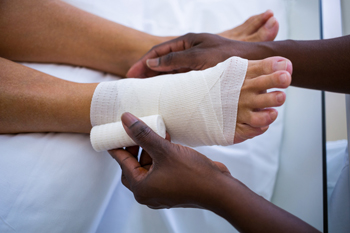Connect With Us
Blog
Items filtered by date: January 2021
Flip Flops May Damage Diabetic Feet
 Flip flops are a type of shoe that is popular to wear during the summer months. There are a variety of styles and colors to choose from and they are simple to wear. Many people enjoy wearing flip flops, despite the fact these types of shoes have little or no arch support. Foot conditions may develop as a result of this, and can cause pain and discomfort. Diabetic patients in particular may be more susceptible to the negative effects of flip flops. Plantar fasciitis affects the heel and sole of the foot, and may gradually occur from wearing shoes that have inadequate arch support. Mild relief may be found when the bottom of the foot is stretched. This can be accomplished by standing on a step while gently lowering one heel at a time. Additionally, many patients find it beneficial to roll the sole of the foot on a tennis ball which is effective in stretching the plantar fascia. If you have questions about how flip flops can affect the feet, it is suggested that you confer with a podiatrist.
Flip flops are a type of shoe that is popular to wear during the summer months. There are a variety of styles and colors to choose from and they are simple to wear. Many people enjoy wearing flip flops, despite the fact these types of shoes have little or no arch support. Foot conditions may develop as a result of this, and can cause pain and discomfort. Diabetic patients in particular may be more susceptible to the negative effects of flip flops. Plantar fasciitis affects the heel and sole of the foot, and may gradually occur from wearing shoes that have inadequate arch support. Mild relief may be found when the bottom of the foot is stretched. This can be accomplished by standing on a step while gently lowering one heel at a time. Additionally, many patients find it beneficial to roll the sole of the foot on a tennis ball which is effective in stretching the plantar fascia. If you have questions about how flip flops can affect the feet, it is suggested that you confer with a podiatrist.
Flip-flops are not always the best choice of footwear. If you have any concerns about your feet or ankles, contact Dr. Royall from Mountain View Foot & Ankle Clinic. Our doctor will assist you with all of your foot and ankle needs.
Flip-Flops and Feet
When the weather starts warming up, people enjoy wearing flip-flops. Flip-flops are comfortable, stylish, and easy to slip on and off; they're perfect for any summer beach goer. However, these shoes can cause harm to the feet.
How Can Flip-Flops Affect Me Long-Term?
- Ankle problems
- Hip problems
- Lower back problems
- Pain in the balls of the feet
- Problems with foot arches
- Changes in the way you walk
Are There Injuries Associated with Flip-Flops?
Yes. Since flip-flops are relatively weak and do not provide the same amount of support as sneakers, people who wear flip-flops regularly are more susceptible to injuries. On top of that, the open nature of the shoe makes your feet more prone to other problems, such as cuts and even infections. Common injuries and ailments include:
- Sprained ankles
- Blisters
- Infections
- Cuts and Scrapes
I like Wearing Flip-Flops. Are There Safe Alternatives?
When buying flip-flops, try to find ones that have sturdy soles and that are made of high-quality materials that will support for your feet. These flip-flops will cost more but will also last longer as a result.
If you have any questions please feel free to contact our office located in Lehi, UT . We offer the newest diagnostic and treatment technologies for all your foot and ankle needs.
Signs That Foot Wounds Should Be Checked
 An ulcer that develops on the foot is a wound that may not heal. This type of ailment can cause severe pain and discomfort and is common among diabetic patients. Redness on and around the affected area is often the first sign of a foot wound, and additional symptoms can include an unpleasant odor and possible drainage. There are several reasons why foot wounds may occur. These can consist of living a sedentary lifestyle, nerve damage, or circulation problems. Additionally, medical conditions such as high blood pressure and diabetes may make developing wounds on the feet more likely. If you are prone to foot wounds, it is strongly suggested that you are under the care of a podiatrist who can effectively treat this problem.
An ulcer that develops on the foot is a wound that may not heal. This type of ailment can cause severe pain and discomfort and is common among diabetic patients. Redness on and around the affected area is often the first sign of a foot wound, and additional symptoms can include an unpleasant odor and possible drainage. There are several reasons why foot wounds may occur. These can consist of living a sedentary lifestyle, nerve damage, or circulation problems. Additionally, medical conditions such as high blood pressure and diabetes may make developing wounds on the feet more likely. If you are prone to foot wounds, it is strongly suggested that you are under the care of a podiatrist who can effectively treat this problem.
Wound care is an important part in dealing with diabetes. If you have diabetes and a foot wound or would like more information about wound care for diabetics, consult with Dr. Royall from Mountain View Foot & Ankle Clinic. Our doctor will assess your condition and provide you with quality foot and ankle treatment.
What Is Wound Care?
Wound care is the practice of taking proper care of a wound. This can range from the smallest to the largest of wounds. While everyone can benefit from proper wound care, it is much more important for diabetics. Diabetics often suffer from poor blood circulation which causes wounds to heal much slower than they would in a non-diabetic.
What Is the Importance of Wound Care?
While it may not seem apparent with small ulcers on the foot, for diabetics, any size ulcer can become infected. Diabetics often also suffer from neuropathy, or nerve loss. This means they might not even feel when they have an ulcer on their foot. If the wound becomes severely infected, amputation may be necessary. Therefore, it is of the upmost importance to properly care for any and all foot wounds.
How to Care for Wounds
The best way to care for foot wounds is to prevent them. For diabetics, this means daily inspections of the feet for any signs of abnormalities or ulcers. It is also recommended to see a podiatrist several times a year for a foot inspection. If you do have an ulcer, run the wound under water to clear dirt from the wound; then apply antibiotic ointment to the wound and cover with a bandage. Bandages should be changed daily and keeping pressure off the wound is smart. It is advised to see a podiatrist, who can keep an eye on it.
If you have any questions, please feel free to contact our office located in Lehi, UT . We offer the newest diagnostic and treatment technologies for all your foot care needs.
Blog Archives
- April 2025
- March 2025
- February 2025
- January 2025
- December 2024
- November 2024
- October 2024
- September 2024
- August 2024
- July 2024
- June 2024
- May 2024
- April 2024
- March 2024
- February 2024
- January 2024
- December 2023
- November 2023
- October 2023
- September 2023
- August 2023
- July 2023
- June 2023
- May 2023
- April 2023
- March 2023
- February 2023
- January 2023
- December 2022
- November 2022
- October 2022
- September 2022
- August 2022
- July 2022
- June 2022
- May 2022
- April 2022
- March 2022
- February 2022
- January 2022
- December 2021
- November 2021
- October 2021
- September 2021
- August 2021
- July 2021
- June 2021
- May 2021
- April 2021
- March 2021
- February 2021
- January 2021
- December 2020
- November 2020
- October 2020
